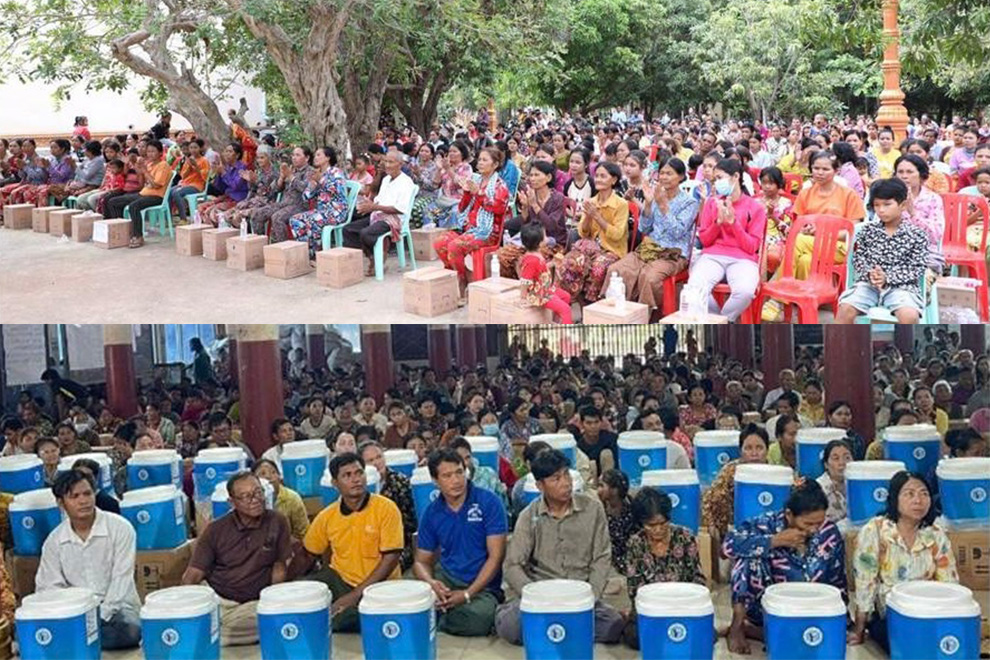April 11, 2025
PHNOM PENH – More than 70,000 improved cooking stoves — which reduce wood use by over 65 per cent — and water purifiers will be distributed free of charge to residents in communities in protected natural areas by the end of 2026.
Their distribution is part of a $40 million investment project to support efforts to reduce greenhouse gas emissions, contributing to Cambodia’s national goal of carbon emission reduction.
The plan was announced during the signing of the “Free Distribution of Improved Cookstoves and Water Filters to Citizens” memorandum of understanding (MoU) between representatives of the SIPCO company and Mean Som An, chair of the Senate’s 8th Commission and vice-president of the Cambodian Women for Peace and Development Association.
“The Ministry of Environment has received 36,574 improved cooking stoves and 36,575 clean water filters, which will be distributed to households in protected area communities in 2026,” said ministry spokesperson Khvay Atitya.
The ministry explained that the stoves absorb heat more efficiently — over 38 per cent — helping to reduce firewood consumption by more than 65 per cent, when compared to traditional cooking methods. The project is expected to generate high-quality carbon credits for the international aviation industry.
The total investment for the project is $40 million, divided into two phases, Phase 1, from 2022 to 2025, and Phase 2, from 2025 to 2027.
The initiative will cover all of the Kingdom’s rural regions, with the aim of distributing 600,000 stoves and 620,000 water purifiers. The free distribution of these items is expected to improve the health of five million people.

Energy-saving stoves and water purifiers are distributed to members of a rural community in the past. PHOTO: SIPCO/THE PHNOM PENH POST
eight provinces: Kampot, Kep, Svay Rieng, Prey Veng, Tbong Khmum, Kampong Speu, Kampong Thom and Kampong Cham.
While the stoves will reduce firewood consumption and cut emissions, the water purifiers will also reduce the use of stoves to purify water, which is generally done by boiling it, in rural households.
The new project is registered on the Verra platform with VCS 2925 and VCS3052 ID. It has been approved by Article 6 of the Paris Agreement under the guidance on the implementation of Article 6 of Paris agreement issued by the Cambodian environment in June 2024, allowing it to trade international carbon credits.
“The surplus will reduce greenhouse gas emissions, partly contributing the goal of reducing emissions of the Kingdom of Cambodia,” read the project’s concept note.
Technical teams from Verra, SIPCO and the Cambodian Women’s Association’s central committee are collaborating to monitor the use and quality of the improved stoves and filters.
This initiative has been warmly welcomed by local authorities and residents alike, as it promotes public health, reduces household expenses and energy use, helps prevent deforestation and limits environmental pollution.
It also contributes to both the Cambodian government and international community’s broader efforts to combat climate change and alleviate poverty.
The MoU was signed during the March 28-31 “Responding to Climate Change: Lessons and Urgent Actions for the Future” workshop.
The event was attended by members of the Senate, National Assembly, provincial councils, central representatives of the Women’s Association, and representatives from Stung Treng, Mondulkiri, Kampong Cham, Kampong Thom and Siem Reap provinces, as well as the company INTRACO — a total of 24 participants — in Da Nang, Vietnam.
The meeting was held to assess and evaluate the implementation of Phase 1 of the project. It also included discussions on the second phase and concluded with the official signing of the Phase 2 implementation agreement.
In Phase 2, the project will continue distributing stoves and filters. The initiative will be carried out in collaboration with the Cambodian Women for Peace and Development Association, the Cambodian Red Cross and the environment ministry.


